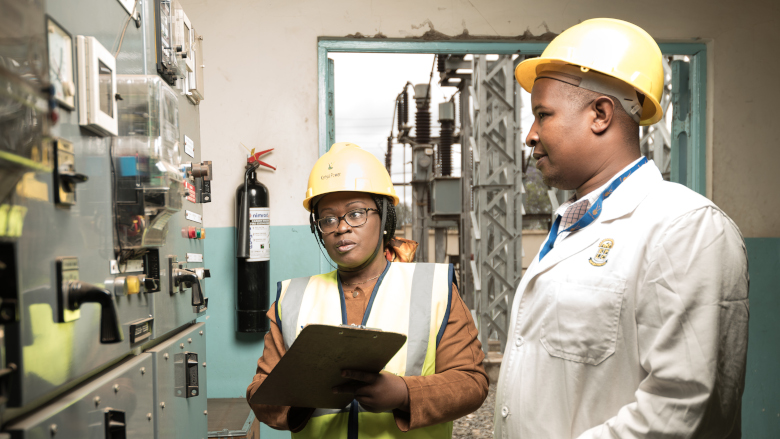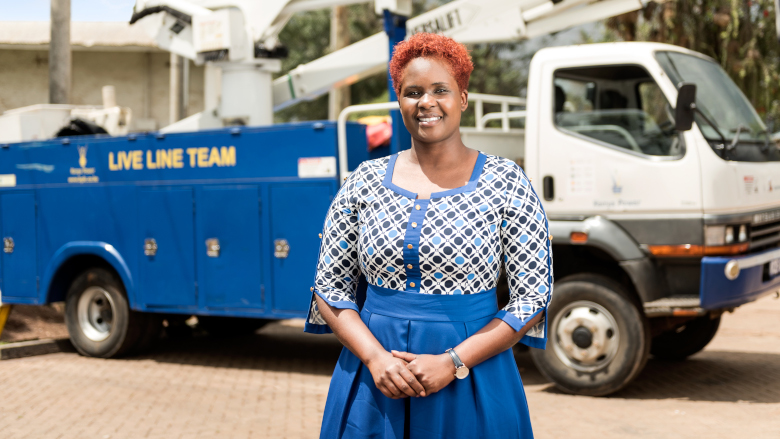
Eng. Esther Ruto
General Manager, Power Distribution and Regional Coordination Directorate, Kenya Rural Electrification and Renewable Energy Corporation
A week into university, Esther Ruto switched her study from commerce to engineering, a degree that was regarded as unfeminine. Now she leads the effort to electrify 100% of Kenya’s countryside.
“The intimidation from the men was very bad there at that time,” she said. “There were members of my class who were always encouraging me, including my (sole) female colleague. So it is like we worked together through graduation.”
“Picking a village that had no electricity two years ago, or even one year ago, you can see a lot has changed in that time. You will find that where there were just two or so shops, you will find maybe forty shops have come up. But the joy comes in when you go to connect a poorer lady who did not expect to see electricity in her day, when she switches on that light.”

Sarah Wepukhulu
Connectivity Manager, Kenya Power and Lighting Company
Sarah Wepukhulu first joined KPLC from the private sector, as an engineer in its telecommunications team, maintaining the generation plants’ fibre services.
“The gentlemen who were inducting me did not mind telling me, ‘you have young children, so you do not have to accompany us to the field’. It is remote. It is substations, generation stations, so it is not a hotel for you to get a nice sleep in.”
“Their motive was good. They thought they were giving me an easier path,” she said. “I really had to decide, this is my profession. What you are doing, I am going to do that. Where you go, we will go together. Where you sleep, I am sleeping there. I have done literally everything an engineer can do except climb up the power pole.”

Grace Aswani Ngigi
Insurance and Integrity Manager, Kenya Power and Lighting Company
Grace Aswani Ngigi, Insurance and Integrity Manager of KPLC, faced twin challenges when she joined in 1996 to negotiate insurance contracts for the company. Firstly, as a woman in a male dominated sector, and secondly as a non-engineer in a technical industry.
“I was so prepared. I went out of my way to read and read and read on the power substations. I knew all of them. I knew all the generation stations, I would visit them all, sometimes even take the helicopter. Not because you want to shine but you want to have that sense of confidence. If you go somewhere unprepared, it will be used against you. Men get away with it, but if you are not prepared then it will be judged much more harshly than for a man.”
“It is important that you know that you have something that your male colleague may not.”

Catherine Gitamo
Learning and Development Manager, Kenya Power and Lighting Company
When Catherine Gitamo joined KPLC four years ago as its learning and development manager, she was called a “little girl.”
“I was one of the youngest managers in the organization,” she said. “And I was a woman. So I had a lot to prove.”
“We are seen as fighters. I do not see it that way. I see it as inclusivity. If our male colleagues hold meetings late into the night, when women have childcare responsibilities, sometimes they do not really stop and think twice about it. If you do not pull up your seat and sit at the table, they will just continue and never even notice that.”
“If you do not go out of your way, you find that society will support you to remain where you are. Society supports women to remain where they are. If you choose to stay at home society will support you. So you have to go out of your way and break that glass ceiling.”

Agnes Obara
Chief Planning Officer, Regional Planning, Kenya Power and Lighting Company (KPLC)
Agnes Obara started at KPLC as an economist working in customer service, and now ensures the company’s strategic direction is reflected in regional initiatives, as well as chairing its gender committee.
“Whatever you do, you have to do it with all your heart and strength,” she said. “Because as you exert yourself, you learn new skills; you get fulfilment, and you also get knowledge. When I go to the regions, I am able to understand what they are going through with customer service, because I have experience working at the service desk. No experience on your journey is ever lost.”
“At the gender committee, we continually report and develop initiatives towards increasing the gender diversity levels not just in the total representation of women, but also at every level of the organization.”
“I have recently been working on an electrification project for the counties that have the least access to electricity. Women bear the brunt of poor energy and lighting resources. Access to electricity improves their economic and social well-being.”
